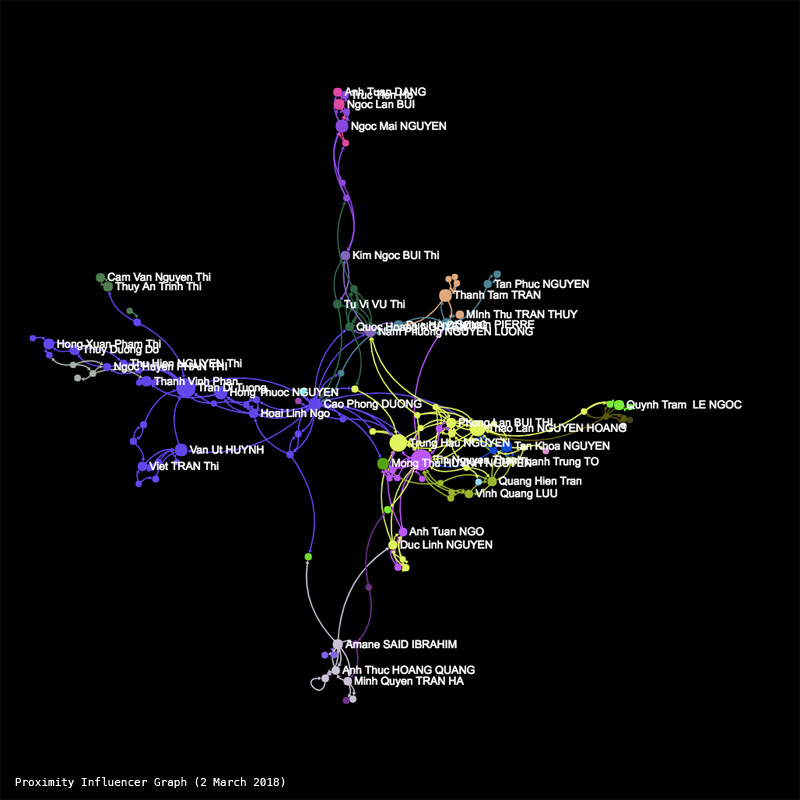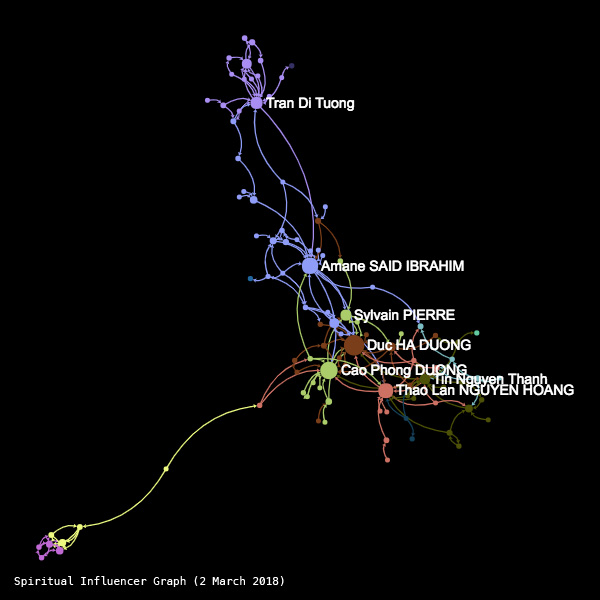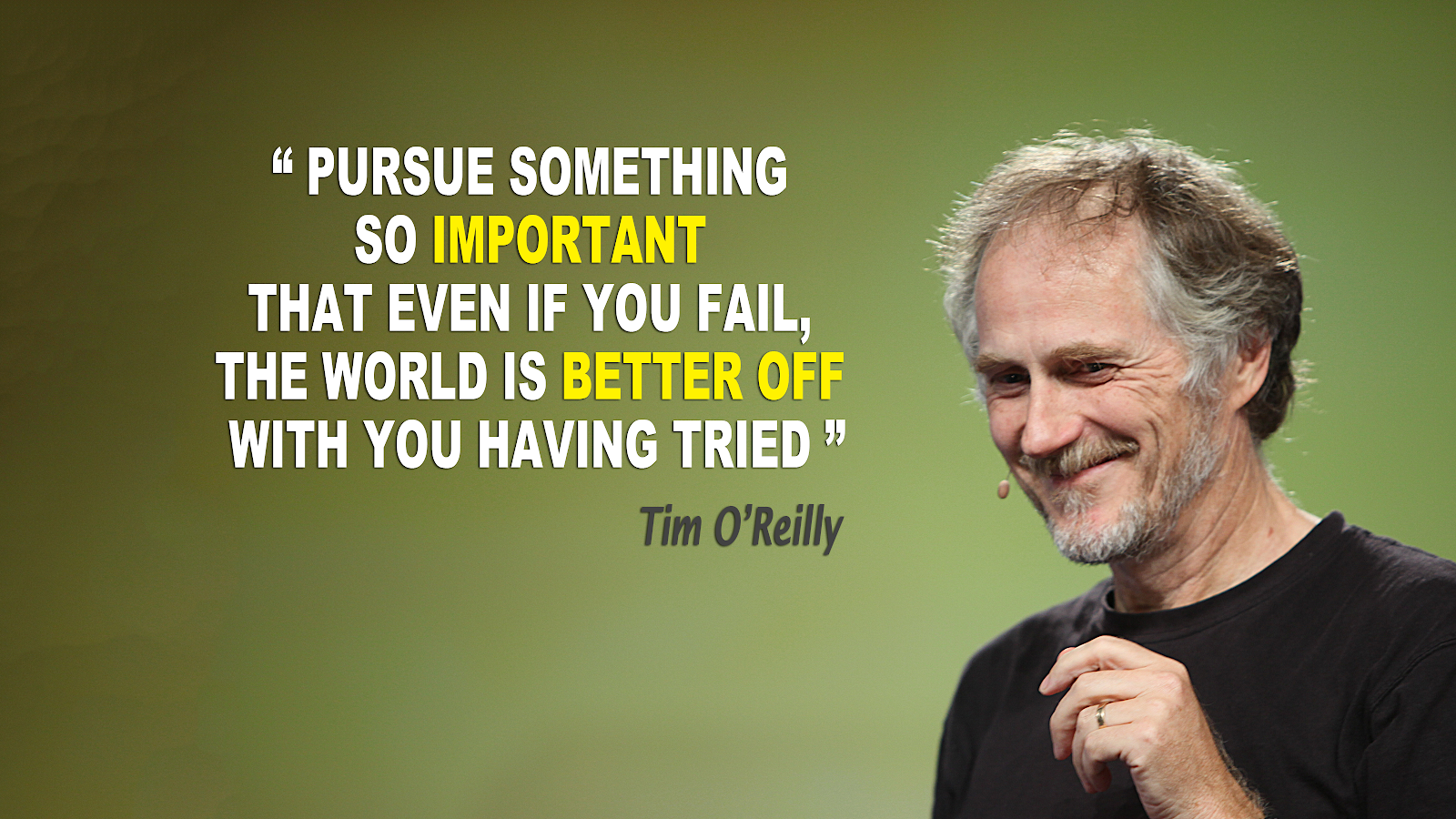Officience - FAQs
Do you think someone (Vietnamese) in Officience, enough understanding your idea? I ask this question this most of theory/ideas coming from Western were misunderstand or apply a half in Vietnam history. Suppose that you had good ideas, but who can apply it completely or correctly. Sorry I’d like to say you are not Vietnamese, different Vietnamese’s view from Vietnam communist’s society, and different belief too.
Duc : Well I'm not in everyone's brain, but don't you, for instance ? I think to find out you should not ask me, but ask others …
Third being said, what you call “my idea”, is, as I understand it, the idea to come back to common sense and civilised friendly behavior, taking care of others. Please correct me if I'm wrong. I agree what is considered “civilised behavior” is actually much dependent on the local culture. Therefore the recommendation “Do as it feels right” will give different outcome in different countries. Is it a good idea or not ? Well that is questioning if, given full transparency and a common interest, will the Vietnamese culture produce harmony and peaceful living ? I'm an optimist and believer in my country, even if I know I don't understand it fully. Who does anyway ? I am born and raised in France, I have a French education, but I would feel arrogant to say I know French culture fully...
Industrialism, Taylor theories of organisation, pyramidal hierarchy, fordism, consumer society, scientific organization of labor : these are theories/ideas coming from the West. Saying “listen to your heart and be responsible for it” seems to be an approach that respects much more the local culture.
Thousands of human histories showed that every society needs a leader who are most responsible and appropriate. The leader will lead this society to overcome natural disasters, enemies, maybe everyone is happy/unhappy to follow his idea. This is basic structure of societies/companies using with different style and improvement. Without the leader/management, those societies are messy, divided into many smaller groups with different targets, and go to different ways because there is no great decision made by great leaders at very important time. So my question: How do you apply non-manager/leader in Officience that prevents these disadvantages?
Duc : We do have leaders of course ! I totally agree with you that we need leaders and I was first in shock that you write we have non-leader in Officience. But then I realize it seems you merge manager and leader as one single and same thing. It’s different.
A leader if someone who has followers. You lead when other people have so much respect for you that your words will impact their behavior. In Officience we call them Spiritual Influencers. The more followers you have as Spiritual Influencer, the more leadership you have, the bigger is your impact on our organization, the higher is your salary…
Looking at our influence graph, we call all know very precisely who has how much leadership :
If I want to take a big decision that impacts everyone, like moving to a new office, I know who are the 10 people I need to convince, to convince everyone else.
As you notice we can define a hierarchy, based on number of followers, but it’s not pyramidal : one person can choose several leaders, which looks maybe more complex, but it actually a more accurate transcript of reality. First because since people choose themselves, the links are more genuine, second because the fact is we do have respect and are influenced by more than 1 person in our daily lives. Think of it like a Karate federation : people with 20+ followers are like the black belts. If you're a newcomer you will show respect to ALL the black belts you encounter. However, you can freely pick one and decide “This guy is my Master, I will follow his path”.
How can you see and prevent BAD PEOPLE do the BAD THINGS in your company? It is quite hard to say that Vietnamese does a lot of cheating, very short-term thinking. For example, they go to Officience but spending time to work for other companies/their projects. They take advantage of Officience resource to do their personal purpose? Even they take out Officience clients.
Duc : Who am I to judge what is good or bad ? Difficult question. So to simplify it in our context, we have chosen the 5 Causes : Developing Vietnam, Positive Globalization (progress and technology), Creating Shared Value (corporate social responsibility), Sustainability, and Sharing Knowledge (education and free as in free speech).
And we decide that whatever helps these 5 Causes is the Good.
Example a guy wants to make an AI training or a Blockchain training. He is welcome to use Officience resources for that purpose.
So when you mention “personal purpose”, I want to ask you back : what is that person’s purpose ? If that person wants to help Vietnam the same, I am very glad to see him/her do it during the day at Offiplex.
Same if they want to work for other companies/projects : what is the purpose of these projects ?
If you want to launch a new startup that's good for Vietnam I will feel very comfortable to see you doing it at Offiplex, and even funding it. No problem with that, but of course it should be transparent.
Take out Officience clients : actually it did happen several times ! There is a company,Siclo, that was born from a client we declined to take because their budget was too low. The Engager said “I still want to do it, let me take it on my own name”. We stopped paying his salary but he kept working into our office, even hired several other Offies, until they fly today with their own wings.
Another occurrence came in 2D team : the customer wanted such a low price that we can't make it with our own cost. But freelancers who work from home can be cheaper. So we sent the job to them.
Again, transparency is very important. On the other hand, when we discovered someone who was sending opportunities we receive to outside people whom we don't know if their share our Purpose, he was sacked overnight.
Bich Hoa is a grey example : she did things non-transparently, which is bad, but the greater Purpose was still here (helping Vietnam economy by developing technological knowledge and bringing high quality projects to the country), so it’s not so bad.
Do we have any board members (whatever you can name it e.g Funy guys) who question, investigate risks, define company path, planning, These members are responsible for WARNING. For example,
WHAT is exactly our issues? (define issues)
WHY do you take this project (warning RISK/BENEFITS about resource, technical challenges, client contract)
HOW do we have get it done.
Finally, after considering all possible WARNING, and planning. An important decision made to do follow ACTIONs.
I do have mentors who advise me in Paris, yes. But they don't have a big stake in Officience (except for one, Yanai) They ask me regularly about where we are but the problem is they only have my voice and my point of view so they have to believe me. To improve this situation 2 things : create an independent reporting (numbers, facts), that I can forward them. And have other Offies raising their voice and speaking up so that my mentors can have different points of view.
And I have a Hangout called "AskMe Anything" where I also take advice from the first line involved people : all Offies ! I’ll make sure you are in. This being said in this Hangout few people have enough courage to raise difficult questions like you do. I think also many people underestimate either themselves or the importance of this Hangout. Anyway, we have the place to take advice in place, the question now is how can we improve participation ?
I ask this because no one ask reasonable question about U2Guide, for instance is a good project, any risk, who make decision whether we take it or reject. Does this project affect long-term resource planning?
Duc : How to define good or bad ? I think U2 Guide is good because their project is to develop responsible tourism practice, they give back a portion of their revenue to local NGOs. I know Paul since more than 1 year, he is coworking with us at Officaire our French office. When he reached out to us he was in trouble and needed help. I think he deserves our help. I know there are risks that their fail their project, like it is the case for 99% of startups. They keep me updated transparently on their actions and developments to save their project.
They will give us whatever money they can give us. We took this opportunity to train a newcomer BA (Viet), that was a good chance for him to have an nice client that doesn't blame him badly for his learning mistakes. There was a risk that we fail, but seems it’s not the case since they recommended us to another company (the wife of the co-founder is CEO of a web agency) so we will get more business thanks to this successful job. The risk was limited thanks to the fact that Paul would never give us a bad reputation anyway, we have been helping him on his project for free since one year. And even if U2Guide fails, we can be proud of having supported them.
The long term resource planning I have no visibility indeed. But I didn't force anyone to take this project. I just send to Engagement team and see if someone wants to take it onboard. I guess whoever took it onboard did consider all the parameters available.
About Finance planning. We have more than 10-years’ experience and doing business in VN. Do we have any saving money/backup to pay salary for employee when something unexpected happens like economy crisis, no payment from clients on-time? Moreover, the saving money is considered as investment money, we will invest start-up ideas, develop high-tech person, or spending AI, big data research, etc…Sorry again I did not see enough “transparency finance planning” from Officience.
I’m sorry to read that you don't see enough transparency. Did someone refuse to let you access to some kind of information ? Let me know.
I agree I would like more insights too like you but I don't want it so hard that I am willing to pay a financial controller salary just for that. I think we can do it ourselves with our BI skills and data science skills etc.
But there is a good news on that side. Remember the EDHEC business school visit ? A team of 4 people decided to study our case and they promised to make a financial analysis free of charge for us :-)
Of course we try to save money, but we had some hiccups :
After 3 years in 2009 we decide to invest 150k€ into building a data entry facility (CRUNCH project). A new building, a dedicated tool, and R&D in artificial intelligence in the hope to automate the job. We have a big customer from USA. Now Crunch is working fine but the investment is sunk.
After 5 more years, end of 2014, the EUR/VND exchange rate fell badly :
In 2 short months our revenue in VND fell 20%... That was the beginning of a quite rough time. First half of 2015 we burned our cash reserves, second half we started to delay some payments etc.
In 2017 we felt we recovered when the conflict with our previous landlord forces us to move out. That cost again 100k€ deposit, move, renovation, etc…
In a few lines, that's where our savings have been going until now.
Today, our cash situation is a bit tense but it’s not a profitability problem, it’s because several customers (EWM 100k, Auchan 60k, Ineo 50k - Orange was 40k but paid now) are paying late. As a comparison, one month of payroll is 80k.
I write the message to you because if there is no action to resolve these problems completely, one day you will lose your company. No money to make payment for your employees is enough evidence to re-think about Officience. If the company doesn’t pay 2 months’ salary, you company will be bankrupt. More than 10 years to build network, reputation is completely useless. However, the most important is you cannot know CAUSE/and how to resolve.
I am not afraid of Officience being bankrupt, I am not afraid of loosing my company, because I don't feel it is MY own company. I feel it is OUR project. I am afraid of Vietnam being colonized again, stuck as a low-cost country depending on other high-tech countries to survive. We are lacking cash now but it’s a lesson we are growing from. Going forward our engagers will be more strict on payment terms. Hopefully once these customers above pay their dues, it will be less of a problem anyway. Well, we’ll have to discuss how much cash we want to keep as minimum security, how much we want to put into laptops, into finishing the interior design (chairs and co-working space), how much we want to invest into internal projects such as Dinh, R&D, financial controller, how much we want to invest in external startups. Traveling to France… many ideas !
I am eager to re-think about Officience, about how we can better help the 5 Causes to develop. Do you want to discuss that with me ?
References
- Questions Officience (By Duc HA DUONG, Mar 2018)
See Also
- Offy Handbook
- No manager (Q&A)
- Transparency (Q&A)
- Self-managing (Q&A)


